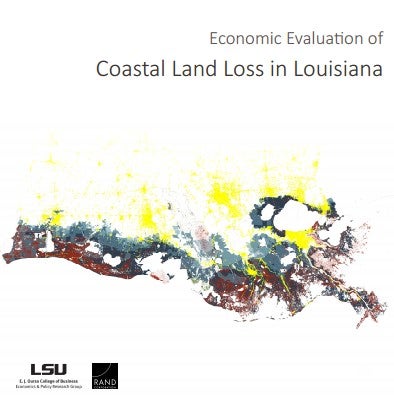New Study: Cost of Not Pursuing Significant Coastal Restoration Could Reach $133 Billion
Louisiana has lost nearly 1,900 squares miles of land since the 1930s. Without future action to restore the coast and reverse this trend, the state stands to lose another 1,750 square miles of land by 2060.
This land loss crisis not only impacts the communities, wildlife and ecology of south Louisiana, but it also puts cities, homes, infrastructure and industries at risk. Coastal wetlands serve as a buffer against the effects of waves, storms and sea level rise. The continued loss of wetlands jeopardizes Louisiana’s diverse economy as well as the entire nation that depends on the Mississippi River Delta for shipping, oil and gas, fisheries, tourism and other industries.
A recent study conducted by the Louisiana State University (LSU) and the RAND Corporation aims to measure the future economic impacts of continued coastal land loss. Commissioned by the Louisiana Coastal Protection and Restoration Authority (CPRA), “Economic Evaluation of Coastal Land Loss in Louisiana” provides a quantitative understanding of the economic damages caused by wetlands loss if we don’t take action now to restore the coast.
The two-year study measures the projected economic costs associated with continued land loss under future-with-no-action scenario, including projected damages to capital stock, such as buildings, homes and roads; disruption of economic activity, including employment and trade flows; and changes in ecosystem services and related industries, such as fisheries, tourism and recreation.
Key findings from the report include:
- $2.1-$3.5 billion: Total replacement cost associated with capital stock at risk from land loss
- $5.8-$7.4 billion: Total annual output (economic activity) at risk from land loss
- $10-$133 billion: Increase in storm damage to capital stock
- $5-$51 billion: Total output lost to increased storm damage
“Every dollar we spend today on coastal restoration and protection will save us many, many more dollars in the future,” said CPRA Board Chairman Chip Kline in a press release. “But beyond being cost-feasible, we’re talking about saving lives, families, homes, business and our way of life. This study by LSU and RAND is important in making our case to Congress and the nation that it is better for many reasons to spend now rather than later.”
Read the full report on CPRA’s website here.
The Times-Picayune (video): Coastal erosion, hurricane could cost Louisiana $133 billion
Learn more about how coastal restoration is important to the economy at OurCoastOurEconomy.org.
